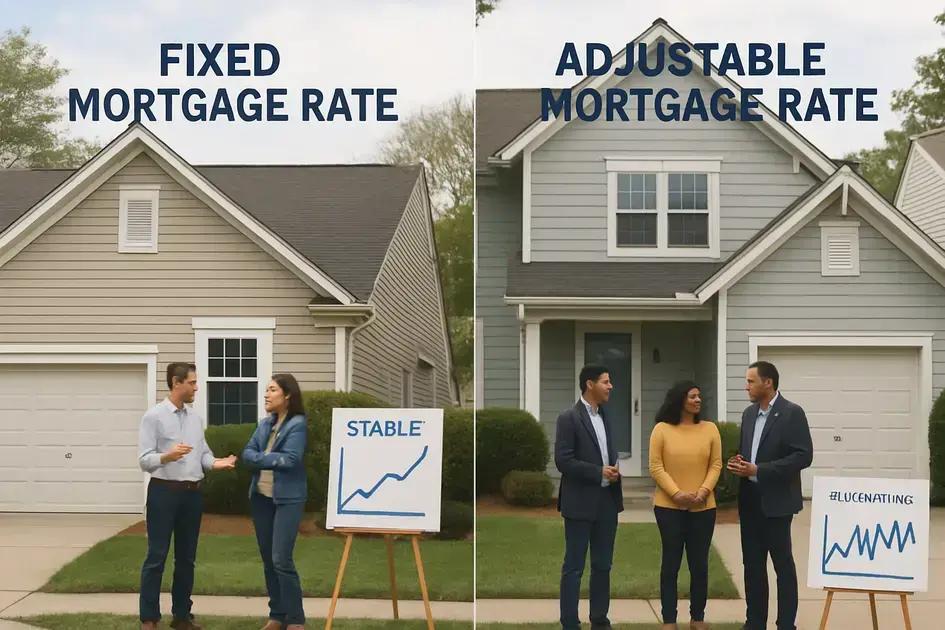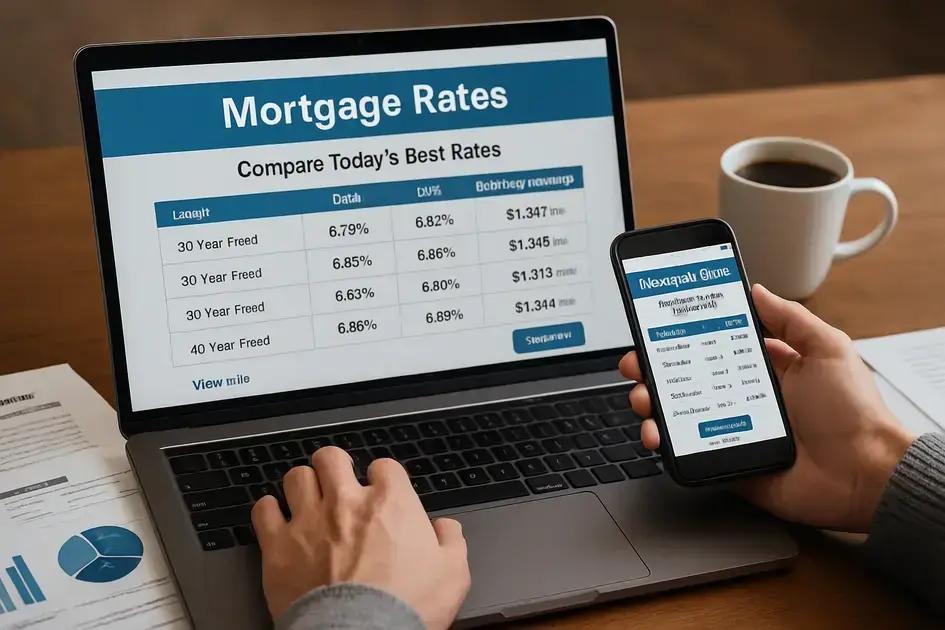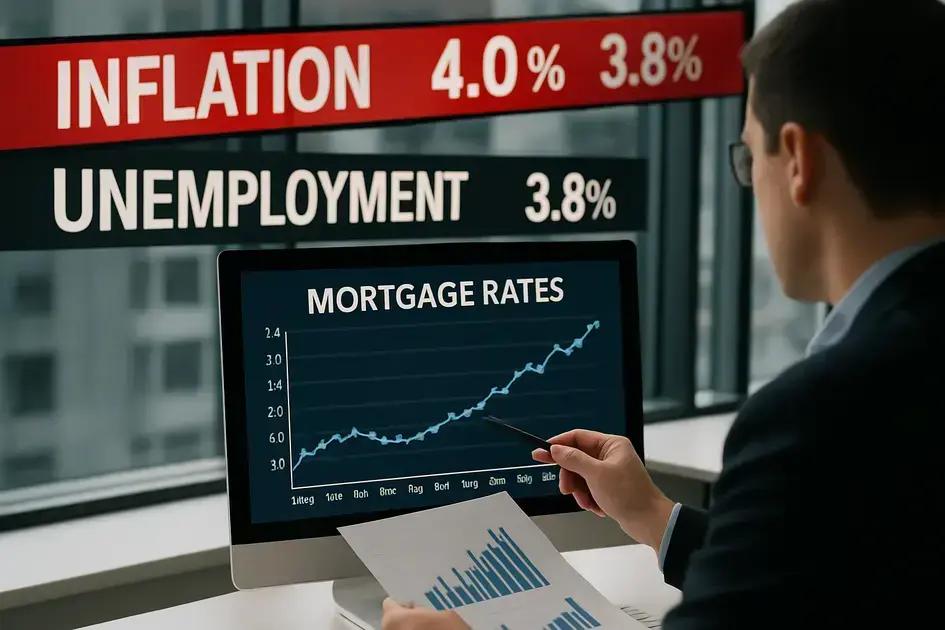Best mortgage rates today refer to the current lowest interest rates available from lenders, influenced by credit scores, economic factors, and loan types, and can be found by comparing trusted online sources and locking rates strategically to save money.
Best mortgage rates today might seem like a moving target, right? You probably wonder how they really work and how you can grab the best one for your budget. Stick around – it’s easier to understand than you think.
how mortgage rates are determined
Mortgage rates are determined by a combination of factors that reflect the overall health of the economy and your personal financial profile. At the core, lenders consider the cost of borrowing money from financial markets and how risky it is to lend to you.
Economic Influences
Rates are heavily influenced by economic indicators such as inflation, employment data, and the decisions made by central banks like the Federal Reserve. When the economy is strong, rates tend to rise; when it’s weak, rates usually fall.
Bond Market Connection
Mortgage rates often track the yield on 10-year government bonds. When bond yields go up, mortgage rates generally increase because lenders demand higher returns. Conversely, when bond yields drop, mortgage rates typically decline.
Your Financial Profile
Lenders assess your credit score, income, debt levels, and loan size to determine the rate they can offer. A higher credit score often translates to better rates because it signals lower risk.
Loan Type and Terms
The type of mortgage—fixed or adjustable—and the loan term (15, 20, 30 years) also affect your rate. Fixed-rate loans usually have higher rates upfront but offer stability, while adjustable-rate mortgages start lower but can change over time.
Market Competition
Lenders compete for borrowers, so their individual pricing strategies and promotions can also impact mortgage rates. Shopping around can help you find the most competitive offer available.
why rates fluctuate daily
Mortgage rates fluctuate daily because they are influenced by many changing factors in the financial world. One of the main reasons is the movement of the bond market, especially the yield on 10-year government bonds, which lenders use as a benchmark.
Economic Data Releases
New information about the economy, like employment numbers, inflation reports, and GDP growth, can cause rates to rise or fall quickly. Positive data often leads to higher rates, while weaker results usually push them lower.
Federal Reserve Policies
The Federal Reserve’s decisions on interest rates and its statements about the economy directly impact mortgage rates. When the Fed raises rates to control inflation, mortgage rates tend to increase.
Supply and Demand
Mortgage rates also shift based on how many people want to borrow and how much money lenders want to lend. When demand for loans goes up, rates may increase, and vice versa.
Global Events
Unexpected events, like geopolitical tensions or financial crises, create uncertainty. Investors often seek safer investments, causing bond yields and mortgage rates to fluctuate unpredictably.
Lender Pricing Strategies
Individual lenders adjust their rates daily based on their costs and competition. Promotional offers or changes in internal policies can lead to different rates being available on any given day.
fixed vs adjustable rate mortgages explained

When choosing a mortgage, you’ll often decide between fixed-rate and adjustable-rate options. Each has unique features that can impact your monthly payment and financial stability.
Fixed-Rate Mortgages
A fixed-rate mortgage has an interest rate that stays the same throughout the entire loan term. This means your monthly principal and interest payments remain consistent, making it easier to budget. Fixed-rate loans typically come in 15, 20, or 30-year terms.
Advantages of Fixed-Rate Mortgages
Because the rate doesn’t change, you have protection against rising interest rates. This stability is especially helpful if you plan to stay in your home for many years or want predictable payments.
Adjustable-Rate Mortgages (ARMs)
An adjustable-rate mortgage starts with a fixed rate for a set period—usually 3, 5, 7, or 10 years—but then the rate can change periodically based on market conditions. After the initial fixed period, the rate adjusts up or down at intervals.
Understanding ARM Adjustments
The adjustments are tied to an index plus a margin set by the lender. This means your payments could go up or down. ARMs often begin with a lower initial rate, which can save money early on.
When to Consider ARMs
ARMs might be a good choice if you plan to sell or refinance before the rate changes, or if you expect your income to grow. However, there is some risk if rates rise significantly after the fixed period.
how credit scores affect your mortgage rate
Your credit score plays a major role in determining the mortgage rate you qualify for. Lenders view your credit score as a key indicator of your ability to repay the loan on time.
What Is a Credit Score?
A credit score is a number that sums up your credit history, including payment timeliness, debt levels, and credit usage. Scores typically range from 300 to 850.
Impact on Mortgage Rates
Higher credit scores usually earn lower mortgage rates. This is because lenders see those borrowers as less risky. Even a difference of 20-30 points can affect your interest rate and monthly payments.
Score Tiers and Rates
Many lenders have tiers such as excellent (above 740), good (700-739), fair (640-699), and poor (below 640). Each tier has a range of interest rates, so improving your score can save you thousands over the loan’s life.
How to Improve Your Credit Score
To increase your score, pay bills on time, reduce credit card balances, fix errors on your credit report, and avoid opening many new accounts at once.
Other Factors Influencing Your Rate
Besides credit score, lenders consider your income, employment history, and down payment size when setting your mortgage rate.
tips to improve your chances of a low rate
Improving your chances of getting a low mortgage rate requires some preparation and smart moves before you apply. Here are key tips to help you secure better terms.
Boost Your Credit Score
A higher credit score is one of the most effective ways to qualify for low mortgage rates. Pay your bills on time, reduce existing debt, and avoid opening new credit lines before applying for a mortgage.
Save for a Larger Down Payment
Lenders often offer better rates if you can put down 20% or more. A larger down payment reduces their risk and can lower your interest rate.
Shop Around and Compare Offers
Don’t settle for the first offer. Compare rates from multiple lenders including banks, credit unions, and online lenders to find the best deal.
Consider Loan Terms
Shorter loan terms, like 15 years instead of 30, usually have lower rates. If you can afford higher monthly payments, this can save you money on interest.
Lock in Your Rate
Once you find a low rate, ask your lender about a rate lock. This guarantees your rate won’t change during the approval process, protecting you from market shifts.
Reduce Debt-to-Income Ratio
Lenders look at your debt-to-income ratio when setting rates. Paying down debts or increasing your income can help you qualify for better rates.
where to find the best mortgage rates online

Finding the best mortgage rates online takes some research but can save you a lot of money. Start by visiting reputable websites that offer updated rate comparisons.
Mortgage Comparison Websites
Sites like Bankrate, NerdWallet, and Zillow provide side-by-side comparisons of rates from multiple lenders. They update rates daily and let you filter results by loan type, term, and credit score.
Direct Lender Websites
Checking rates directly from banks, credit unions, and online lenders can reveal special promotions or discounts that comparison sites might not show.
Financial News and Data Sources
Websites like CNBC or Bloomberg offer broader market insights that impact mortgage rates. Staying informed helps you understand fluctuations and timing.
Online Mortgage Brokers
Mortgage brokers aggregate offers from several lenders to find competitive rates tailored to your profile. Many brokers work online and offer personalized advice.
Use Rate Alerts and Tools
Many sites offer rate alert tools that notify you when rates drop. Online calculators can also help estimate your monthly payments based on different rates and loan terms.
Beware of Hidden Fees
While looking for the best rate, check for fees and closing costs. Some online offers may look attractive but have additional charges that increase your total cost.
understanding mortgage points and fees
Mortgage points and fees are key components that affect the overall cost of your home loan. Understanding them helps you make smart decisions about your mortgage.
What Are Mortgage Points?
Mortgage points are fees paid directly to the lender at closing in exchange for a reduced interest rate. Each point costs 1% of the loan amount and can lower your rate by about 0.25%.
Types of Mortgage Points
There are two main types: discount points and origination points. Discount points reduce your interest rate, while origination points cover the lender’s costs for processing your loan.
When Buying Points Makes Sense
Buying points can save you money if you plan to stay in your home for a long time because the lower monthly payments add up over time. However, if you sell or refinance early, you might not recoup the upfront cost.
Common Mortgage Fees
Besides points, you’ll encounter fees such as application fees, appraisal fees, underwriting fees, and closing costs. These fees cover the lender’s administrative expenses and third-party services.
How to Compare Offers
When comparing mortgage offers, look beyond the interest rate. Consider the annual percentage rate (APR), which includes your interest rate plus points and fees, giving a clearer picture of total borrowing costs.
when to lock your mortgage rate
Locking your mortgage rate means securing the interest rate on your loan for a specific period, protecting you from rate increases during that time. Knowing when to lock can save you money and reduce stress.
Timing the Lock
Mortgage rates can change daily based on market conditions. It’s wise to lock your rate once you find a rate you’re comfortable with and before rates rise.
Typical Lock Periods
Rate locks usually last between 30 and 60 days, sometimes longer. Longer locks may come with a fee, so weigh the cost against the risk of rates changing.
Factors to Consider Before Locking
Consider how close you are to closing your loan, current market trends, and your risk tolerance. If rates look like they might drop, some borrowers choose to wait. If rates are rising, locking early protects you.
Float vs Lock
Choosing to “float” means you wait without locking, hoping rates fall. While it can save money, it carries the risk rates may rise, increasing your costs.
Ask Your Lender About Rate Locks
Some lenders offer float-down options, letting you lock a rate but switch to a lower rate if it drops within your lock period. This flexibility can be valuable.
impact of economic news on mortgage rates

Economic news plays a critical role in influencing mortgage rates. When important economic data is released, it can affect investor confidence and market expectations, which in turn impacts rates.
Key Economic Indicators
Reports on inflation, unemployment, and GDP growth are closely watched. For example, higher inflation can push rates up as lenders expect central banks to raise interest rates.
Federal Reserve Announcements
The Federal Reserve’s decisions on interest rates and monetary policy signals often move mortgage rates. If the Fed hints at tightening policies, mortgage rates may rise.
Market Reactions
Markets react quickly to economic news. Good news about economic growth might lead to higher rates, while signs of economic weakness usually push rates down.
Global Economic Events
International developments like trade tensions, wars, or recessions impact investor behavior and indirectly influence U.S. mortgage rates.
How Borrowers Can Use This Information
By staying aware of economic news, borrowers can better time when to lock in rates or float, potentially saving money by anticipating market moves.
common pitfalls to avoid when choosing a mortgage rate
Choosing the right mortgage rate can feel overwhelming. Avoiding common pitfalls helps you secure a deal that fits your budget and long-term plans.
Focusing Only on the Lowest Rate
While a low rate is attractive, it’s important to consider other costs like points, fees, and loan terms. A lower rate with high fees might end up costing more.
Ignoring the Loan Type
Different mortgages—fixed or adjustable—affect your payments differently over time. Make sure the rate you pick aligns with the loan type that fits your situation.
Not Considering Your Credit Score
Your credit score impacts the rate you qualify for. Applying for a mortgage without improving your credit might result in higher rates.
Skipping Rate Comparisons
Failing to shop around means you could miss better offers. Comparing rates from various lenders gives you a clearer picture of your options.
Overlooking Rate Lock Options
Mortgage rates change daily. Not locking your rate at the right time could lead to paying more than necessary.
Ignoring the Impact of Prepayment Penalties
Some mortgages have penalties if you pay off your loan early. Understand these terms because they can affect your total cost despite a low rate.
Key takeaways on choosing the right mortgage rate
Choosing the right mortgage rate involves more than just picking the lowest number. Consider all costs, your loan type, and your credit score to find the best fit for your needs.
Shopping around and understanding rate lock options can protect you from costly mistakes. Being aware of prepayment penalties and other terms ensures you won’t face surprises later.
By avoiding common pitfalls, you can secure a mortgage that supports your financial goals and brings peace of mind as you move forward with your home purchase.
FAQ – Common questions about mortgage rates and loans
What is the difference between fixed and adjustable mortgage rates?
Fixed rates stay the same throughout the loan term, offering stable payments. Adjustable rates start low but can change periodically based on market conditions.
How does my credit score affect my mortgage rate?
Higher credit scores usually qualify for lower mortgage rates because lenders see those borrowers as less risky.
When should I lock my mortgage rate?
You should lock your rate when you find a rate you are comfortable with and before rates rise, typically close to your loan closing date.
What are mortgage points and should I buy them?
Mortgage points are fees paid upfront to lower your interest rate. Buying points makes sense if you plan to stay in your home for a long time to save on monthly payments.
Why do mortgage rates change daily?
Mortgage rates fluctuate daily due to changes in the bond market, economic data releases, Federal Reserve actions, and lender competition.
Where can I find the best mortgage rates online?
You can compare rates on websites like Bankrate, Zillow, and NerdWallet, and also check direct lender websites and online mortgage brokers for competitive offers.
